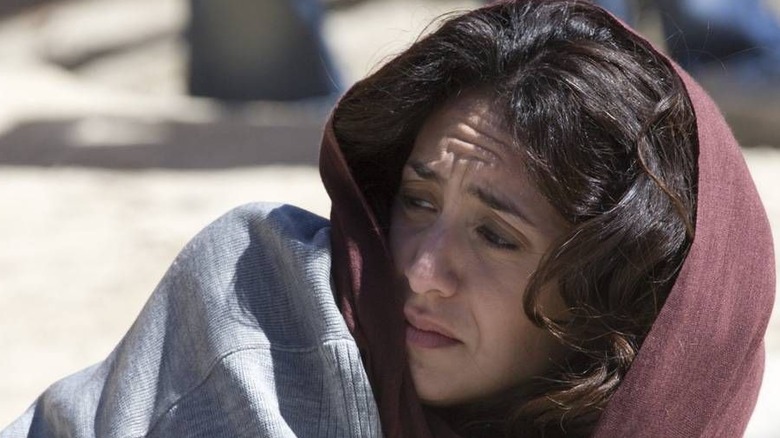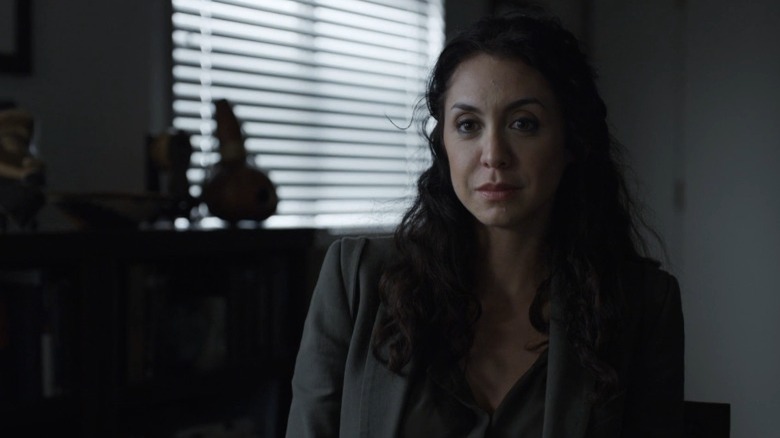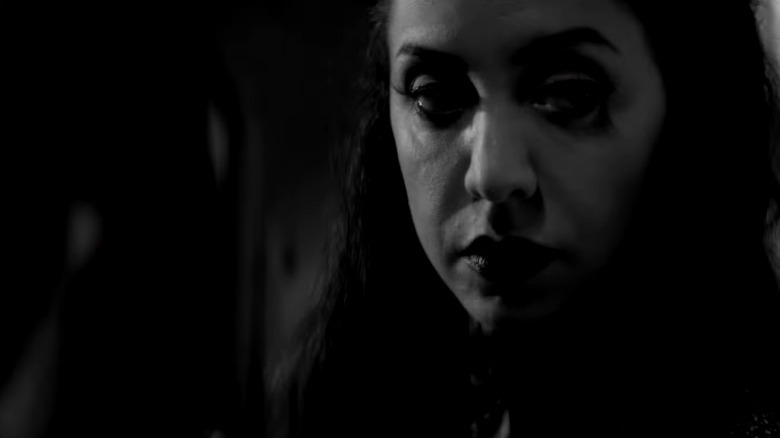Why Samar From The Blacklist Looks So Familiar
NBC's "The Blacklist" has been able to do the impossible: put a new, fresh spin on the case-of-the-week network crime procedural format, keeping itself interesting as both an overarching story and a source of episodic thrills for years on end. It's no wonder that it became one of the network's flagship shows, with dependably high ratings across nine seasons and a tenth one already confirmed.
Part of the appeal of "The Blacklist" comes from the way that the show's writers are able to zero in on engaging character-based conflicts even as the institutional conundrums faced by the central FBI team become more and more complex. The character of Samar Navabi, an Iranian Mossad agent who teams up with the Blacklist task force, offered several examples of that during her time on the show. Introduced on Season 2 as a new team addition, she is initially shrouded in mystery over her true intentions and allegiances, both due to dividing her time between Mossad and the FBI task force and due to her enigmatic relationship with Raymond "Red" Reddington (James Spader). As the show progresses, we come to learn more about Samar's past, and she evolves beyond her wildcard plot role to become a fully-rounded, compelling character in her own right, complete with a lengthy will-they-or-won't-they dynamic with Aram Mojtabai (Amir Arison) and an emotionally dense arc involving her brother Shahin (Sammy Sheik).
The actress who played Samar on "The Blacklist" has several other notable roles to her name; here are a few you might remember her from.
Mozhan Marnò played the titular role in The Stoning of Soraya M.
"The Blacklist" character Samar Navabi is played by Iranian-American actress Mozhan Marnò. Born in Los Angeles to Iranian parents (via The New York Times), Marnò received an MFA from the Yale School of Drama prior to beginning her professional acting career (via Man of Metropolis). She has been acting in films and on TV shows since 2006, beginning with episodes of "The Unit" and "Standoff." But it was in 2008 that she first landed a major screen role, playing the titular character in the Persian-language American film "The Stoning of Soraya M." which premiered at that year's Toronto International Film Festival.
Directed by Cyrus Nowrasteh and based on the 1990 book "La Femme Lapidée" by French-Iranian journalist Freidoune Sahebjam, "The Stoning of Soraya M." tells the purportedly true story of Soraya Manutchehri, a victim of stoning in modern-day Iran, and of her mother Zahra's (Shohreh Aghdashloo) efforts to share her story with the world with Sahebjam's (Jim Caviezel) help. The character of Soraya, a woman whose own husband plots to frame her for adultery so that he can be rid of her and marry a young girl, doesn't get to do much in the film beyond being victimized by the society around her. But, although the film itself proved artistically and journalistically controversial, critics were favorable towards Marnò's harrowing performance, with the Los Angeles Times' Kevin Thomas commending her "superb acting" in the role of a "courageous martyr."
She was Ayla Sayyad on two seasons of House of Cards
In addition to playing Samar Navabi on "The Blacklist," the most prolific role of Mozhan Marnò's career so far has arguably been Ayla Sayyad on Netflix's "House of Cards." Introduced in Season 2, Sayyad is an intrepid journalist working for the fictional newspaper known as the Wall Street Telegraph.
We first see Sayyad as she is following VP Frank Underwood (Kevin Spacey) as part of the White House press pool covering his trip to Spotsylvania County, Virginia. Her role in Season 2 involves serving as the press channel for a leak that benefits the vice-president. She is eventually approached by Connor Ellis (Samuel Page), the Underwoods' communications director, who feeds her privileged information about oncoming developments in U.S.-China trade relations, which she then reports to the Wall Street Telegraph.
Then, in Season 3, she remains a frequent presence in the presidential press room as the Telegraph's official White House correspondent, dependably insisting upon hot-button questions and pursuing the truth about controversial subjects. In fact, her boldness is so unmitigated and unusual that it eventually lands her in hot water, driving home one of the show's many despondent theses about American politics: journalistic integrity never goes unpunished in DC.
In "Chapter 30," Marnò's final appearance on the show, Sayyad embarrasses Frank Underwood by challenging him to make his stance on LGBTQ+ rights clear, causing Communications Director Seth Grayson (Derek Cecil) to revoke her Press Corp credentials.
She co-starred in the underground horror hit A Girl Walks Home Alone at Night
One of the biggest underground horror hits of the 2010s was "A Girl Walks Home Alone at Night," a 2014 black-and-white vampire film from Iranian-American director and writer Ana Lily Amirpour. Touted at the time as "the world's only Iranian vampire Western" (via Wired), the film is both an impassioned genre pastiche and a genuinely haunting and soul-piercing foray into the eternal themes of vampire fiction, from loneliness and despondency to power and desire.
Despite being an American production, "A Girl Walks Home Alone at Night" is also notable for being set in Iran, in an unidentified ghost town, and featuring all Persian-language dialogue, thereby zeroing in on a corner of the world that horror movies haven't always elected to explore.
The film follows the titular, unnamed Girl (Sheila Vand), a vampire, as she wanders around the city in search of potential victims, eventually striking up a romance with Arash (Arash Marandi). At a certain point in the film, the Girl forms an unexpected connection with Atti, a prostitute who is caught between the abusive whims of pimp Saeed (Dominic Rains) specifically, and the cruelty of a patriarchal society more broadly. Atti is played by Mozhan Marnò, who gets to hold the focus of one of the film's most memorable scenes in which the Girl confesses to Atti that she's been watching her, and comes to the conclusion that the cynical, hard-edged woman "[doesn't] remember wanting."



